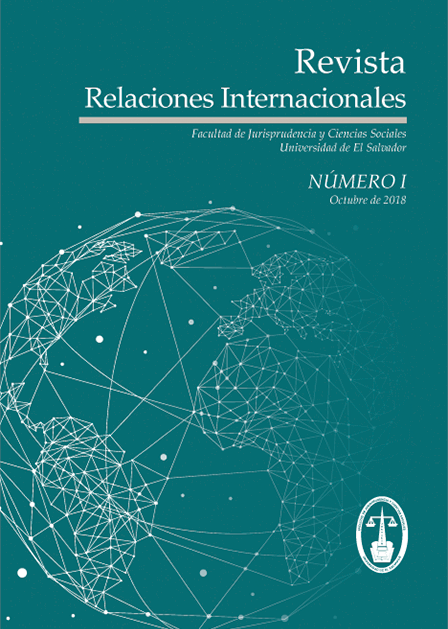Bolivia and Chile before the International Court of Justice of The Hague: the expectative rights and the unilateral acts of the States
Keywords:
International Law, Expectation Rights, Unilateral Acts, International Promise, International Court of Justice, Chile, Bolivia, Pacific War, uti possidetis iurisAbstract
For decades, the condition of a Mediterranean country has characterized the Plurinational State of Bolivia, this determinant in its geopolitics acquired after the signing of the 1904 Peace Treaty with which the Pacific War ended, has always been a character that the country refuses to accept. Throughout the last century Bolivia has tried to obtain an exit to the Pacific Ocean through negotiations with Chile, but these have never been able to advance. In the 21st century, a radical change in the treatment of this issue came up, Bolivia sued Chile before the International Court of Justice in La Haya because in its opinion the latter has failed to fulfill the obligation it has with Bolivia to negotiate an exit to the Pacific Ocean. In the light of the existing jurisprudence in the area of unilateral acts and before the ruling of the preliminary objections presented by Chile, a sentence that in practical terms would be useless is seen in La Haya.
Downloads
References
Andrés Javier Feres Montecinos “Pretensión Marítima Boliviana y su Factibilidad como Reclamo ante la Corte Internacional de Justicia de La Haya: Análisis histórico y jurídico.” (Tesis de Grado, Universidad de Chile, 2013), 27-31.
Sergio Guerra Vilaboy, La dramática historia de la Guerra del Pacífico (1879-1883) y de sus consecuencias para Bolivia, Revista Izquierdas (2013): 193-213 www.izquierdas.cl.
Jorge Basadre, Historia de la República del Perú, (Lima: Peruamérica, 1964)., y Margarita Guerra Martiniere, La ocupación de Lima (1881-1883). El gobierno de García Calderón (Lima: Pontificia Universidad Católica del Perú, 1991) 482.
Roberto Querejazu, Guano, salitres y sangre (La Paz: Librería Editorial «Juventud», 1998), 606.
Félix Denegrí Luna, Perú-Bolivia: Una etapa histórica de sus complejas relaciones (1910-1929) (Lima: CEPEI, 1998).
Hugo Llanos Mansilla, La mediterraneidad de Bolivia (Santiago de Chile: Agenda Internacional, 2004), 21., y Pía Ondiz de la Paz, La mediterraneidad de Bolivia: las negociaciones bilaterales de 1950 y 1975 entre Chile y Bolivia (Tesis de Magíster en Estudios Internacionales, Universidad de Chile, 2003), 21.
Ramiro Prudencio Lizón, El problema marítimo boliviano (Santiago de Chile: Agenda Internacional, 2004), 32.
Luis Fernando Rosales Lozada, “La importancia del lago Titicaca en las relaciones peruanobolivianas” (Tesis para optar el grado de Maestría en Diplomacia, Academia Diplomática del Perú, 1997), 40.
Ramiro Prudencio Lizón, El problema marítimo boliviano (Lima-Perú: Agenda Internacional, 2004), 36.
Sandra Namihas, La demanda boliviana contra Chile ante la Corte Internacional de Justicia de La Haya (Lima-Perú: Agenda Internacional, 2013), 55-70.
Diego Cardona, “El gas como herramienta de la política exterior de Bolivia hacia Chile en el gobierno del presidente Evo Morales: implicancias para el Perú” (Tesis Academia Diplomática del Perú, 2009), 112.
“Declaraciones del vicecanciller chileno, Fernando Schmidt, al cerrar el encuentro en La Paz, con su homóloga boliviana Mónica Soriano”, La Tercera, 2010. http://www.latercera.com/ contenido/ 674_276446_9.shtml
Pacto de Tregua de 1884 (República de Chile: Ministerio de Relaciones Exteriores de Chile, 1884).
Diario Oficial de la República de Chile, 31 de diciembre 1895.
Roberto Querejazu, Guano, salitres y sangre (La Paz: Librería Editorial «Juventud», 1998), 578.
Tratado para la Transferencia de Territorios 1895 (República de Chile: Ministerio de Relaciones Exteriores de Chile, 1895) Tratado para la Transferencia de Territorios 1895 (República de Chile: Ministerio de Relaciones Exteriores de Chile, 1895).
Roberto Querejazu, Guano, salitres y sangre, 584., y Ronald Bruce St. John, La política exterior del Perú. Lima: Asociación de Funcionarios del Servicio Diplomático del Perú (Lima: AFSDP, 1999), 129.
Sentencia: Obligación de negociar una salida al Océano Pacífico (Bolivia c. Chile). Excepción Preliminar (Países Bajos: Corte Internacional de Justicia, 2015).
S. London y M. E Santos, “Desarrollo e instituciones precarias: la Argentina de los ‘90”, Economía y Sociedad (2007): 129-158.
Lilian del Castillo, “Comentarios sobre el derecho internacional de los actos jurídicos unilaterales”, Estudios de derecho internacional en homenaje del profesor Ernesto J. Rey Caro, vol. 1 (2002): 52- 53.
Eric Suy, Les actes juridiques unilatéraux en droit International public (París: Librairie Générale des Droit et Jurisprudence, 1962).
David Bondia García, Régimen jurídico de los actos unilaterales de los Estados (Barcelona: J. M. Bosch Editor, 2004),83., y Eric Suy, Les actes juridiques unilatéraux en droit International.
Lilian del Castillo, “Comentarios sobre el derecho internacional de los actos jurídicos unilaterales”, 32- 33.
Tania Elena Pacheco Blandino, La jurisprudencia de la CIJ sobre la amenaza nuclear (Buenos Aires: PROLEGOMENON in.omnem.terram2016). https://inomnemterram.wordpress.com/tag/ensayos-nucleares-australia-v-francia-nueva-zelanda-v-francia/
Corte Internacional de Justicia, Caso relativo a los ensayos nucleares (Australia vrs Francia), Ref. (La Haya: Corte Internacional de Justicia, 1974).
Corte Internacional de Justicia, Caso relativo a la delimitación marítima y cuestiones territoriales entre Qatar y Bahréin (Qatar contra Bahréin), Ref. (La Haya: Corte Internacional de Justicia, 1995).
Corte Internacional de Justicia, Caso relativo a la delimitación marítima y cuestiones territoriales entre Qatar y Bahréin (Qatar contra Bahréin) (competencia y admisibilidad), Ref. (La Haya: Corte Internacional de Justicia, 1994).
Downloads
Published
Issue
Section
License
Copyright (c) 2020 Revista Relaciones Internacionales

This work is licensed under a Creative Commons Attribution-NonCommercial 4.0 International License.
The authors transfer the copyright rights in favor of the Faculty of Jurisprudence and Social Sciences of the University of El Salvador (through Aequus Editorial) to include their writing in Revista Relaciones Internacionales.








